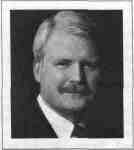Legal/Legislative Scene Election Year Re-ignites Tax Cap Debate by Peter M. Murphy IAPD General Counsel   Recently amended legislation (House Bill 17)
Recently amended legislation (House Bill 17)
expands the purview of the tax cap to include all counties within the state of Illinois. The legislation allows a county board to submit to the voters of the county the question of whether or not to make all non-home rule taxing districts subject to the tax cap. The legislation protects the ability of taxing districts to issue debt by establishing the debt service extension base at an amount equal to the extension for such purposes for the levy year in which the referendum is passed. House Bill 17 passed the Illinois House on April 17, 1996, by a vote of 80-25 and was initiated in response to downstate tax cap legislation previously passed by the Illinois Senate. This legislation is expected to be debated and pass the Illinois Senate in some form before the end of this legislative session. Downstate park district boards should carefully review this legislation with the district's staff and attorney to determine the exact impact on their agency. More information will be coming from IAPD on this piece of legislation and roundtables are scheduled to assist the membership in dealing with the tax cap (see dates on page 11). On other fronts, House Bill 3057 was passed by the House of Representatives on an 89-7 vote and moved to the Illinois Senate where it passed unanimously out of the Senate Local Government Committee. House Bill 3057 makes the following five changes to the Park District Code: 1. Requires that park district annexation ordinances be filed only in the county where annexation takes place. Currently the statute requires filing in every county in which the district is located. For example, if a park district is located within both DuPage and Cook counties and the property being annexed lies in DuPage, the park district would no longer have to file with the clerk and recorder in both DuPage and Cook counties. Since Cook County authorities have no jurisdiction over DuPage territory or tax extensions, it makes no sense to continue this requirement. 2. Permits park districts to enforce all personal conduct and criminal provisions of the district on any park district land located outside the district's boundaries. These park district ordinances may be enforced by any police force having jurisdiction within the property. This authority would permit the park district to extend its ordinances in important areas including those governing the consumption of liquor. 3. Limits park district lease of property to a period not to exceed 99 years and permits lease to not-for-profit organizations in addition to those providing recreational services to the disabled. This provision expands the types of not-for-profit corporations to which park districts can lease property. However, all land that is leased must continue to be held and used for public park and recreation purposes. Giving park districts the ability to lease park property to not-for-profit corporations encourages the formation of public/private partnerships to serve our communities. Under this authority park districts will be able to consider creative methods of financing park improvements and expanded programming, allowing facilities to be constructed and programs provided 10 * Illinois Parks & Recreation * May/June 1996 Legal/Legislative Scene without raising property taxes. 4. Limits park district lease authority for property not required for park purposes to a 50-year period. Currently, Section 10-7 of the Park District Code provides that any lease for park property may not exceed the term of years provided for in Section 8-15 governing installment purchase contracts which are limited to 20 years. This restriction creates major problems for individuals or companies trying to secure project financing. It is customary for financial institutions to require a minimum of term-plus 15 years as collateral for lease type transactions. Thus, a 30-year note term would require a minimum 45-year lease arrangement. It is also worth mentioning the issue of sale versus lease. Park districts currently have the power to sell up to three acres while leasing is restricted to 20 years. Therefore, the only statutory alternative to a lease would force the district to sell park district property which is a permanent transaction that takes property out of public use. Land leases present an alternative that allows property to be retained in public ownership while providing an economic return for a district. In most cases, both the land and the improvements are available to a district at the end of the lease term. 5. Amends the Park District Code and Park District Police Act to clarify that park police jurisdiction is limited to park land except in cases of fresh pursuit or subject to a valid intergovernmental agreement. This provision further requires compliance with the Illinois Police Training Act and Peace Officer Firearm Training Act. Items 1 and 2 are also included within the provisions of Senate Bill 1402 which recently passed the Illinois General Assembly. Other legislation of interest follows:House Bill 2529 (Saltsman)
Status: Senate, third reading.House Bill 3047 (Leitch et al)
House Bill 3141 (Cowlishaw) House Bill 3193 (Parke) Senate Bill 1402 (DeAngelis) Senate Bill 1645 (Dillard)
LEGISLATIVE CONFERENCE
OFFERS OPPORTUNITY TO
LEARN HOW TO LOBBY Information on how to lobby, provide testimony and write letters to the Illinois General Assembly is available free-of-charge from IAPD, as is the educational video, "The Grass Roots Commitment II," which details the steps that park boards and staff can take to become more involved in the legislative process and the future of park districts. DOWNSTATE TAX CAP
ROUNDTABLES June 10 June 26 June 27 Illinois Parks & Recreation * May/June 1996 * 11 |
||||||||||||||
